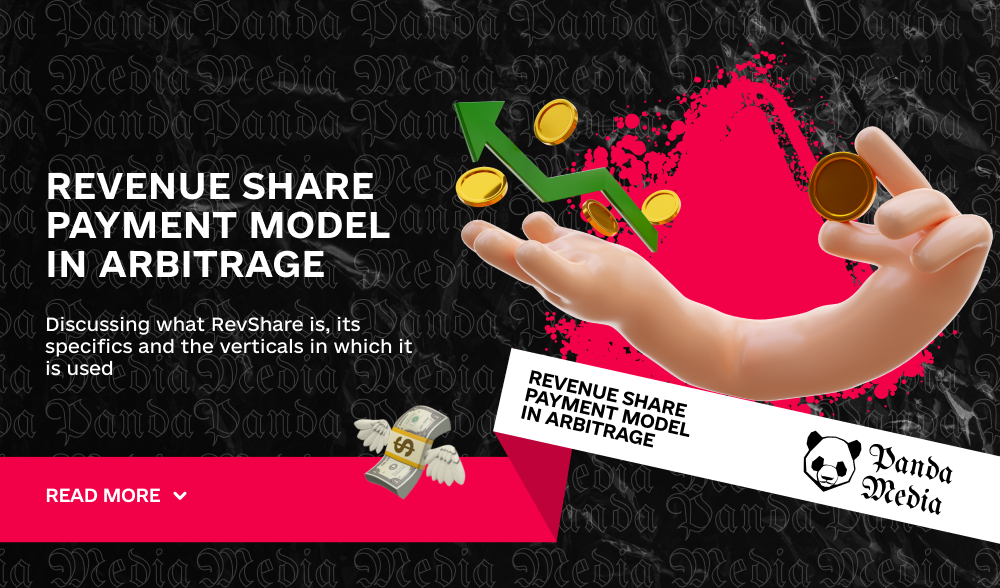What is RevShare?
Revenue Share, RevShare, or revshare is a payment model in affiliate marketing, according to which webmasters are rewarded as a percentage of the advertiser’s revenue generated from the generated leads.
Paradoxically, no one pays a pure percentage of income. The fact is that each user cost already includes hidden resource fees (Admin Fee). This leads to the fact that the actual percentage of income is much lower than stated.

Differences from other payment models
RevShare differs from the pay-per-action model and other “Cost-per-…” models by the calculation method and the period of payment accrual.
If you work on a CPA basis, one lead guarantees you payments according to the terms of the offer. The money is yours as soon as the lead is approved. With RevShare, you work for a percentage from a distance. The frequency of payments will depend on the frequency with which users spend money on the advertising resource. And the amount of payments depends on how much they spend.
The Hybrid payment model combines the principles of revshare and CPA. It includes both payments for the targeted action and percentage payments. In this case, the webmaster receives both a fixed payment for each confirmed lead and a percentage of the player’s expenses. As a rule, the possibility of working with this payment model is discussed personally with the affiliate program manager.
Features of RevShare
Many nuances are not so easy to identify but should be taken into account. Let us consider the example of the gambling vertical:
Payout formation. Payouts depend not only on the percentage of the reverse and the amount of casino revenue but also on the Admin Fee. They include bonuses received by players, commissions to slot machine providers, payment system commissions, administrator fees, website maintenance, and losses on currency transfers. For example, it can be more profitable to work with an affiliate network with a 25% commission rate than with one with a 40% commission rate. This is possible if the amount of commissions in the second case is significantly higher than in the first.
The “step” system. Affiliates can set a dynamic percentage of the commission. It will depend on the number of players brought and deposits made per unit of time. The higher the number, the higher the percentage. Conversely, if a webmaster stops referring new customers to the advertiser, the reviewer’s rate can be reduced or canceled. The community does not approve of this approach, but some advertisers use it.
Post-clicks. Affiliate networks have their policies on post-clicks. This is the time when cookies are stored by a user who has accessed a resource through an affiliate link. For example, it may happen that a registered user has not deposited in 30 days. If the post-click period is 30 days, then this user is “untethered” from the website that converted him or her. Further expenses of this player are paid exclusively to the casino and are not paid by the reverse.
Limits. Some affiliates can set a limit on the profit from a referred player. That is, if a player has brought the webmaster, say, $1000 for the whole time, and this amount is the maximum in the affiliate program, then the subsequent expenses will no longer be tied to a particular website.
Duration. A condition can be the duration of the user’s binding. If the linking period has expired, the expenses of the referred player no longer bring income to the arbitrageur. Not to be confused with post-clicks.
Lifetime profit. In some cases, a referred player can generate income for the arbitrageur for a long time, and in theory, it can be unlimited. For example, you might have converted a user in 2018, and he is still playing steadily in ads. If the terms of the offer allow, he will continue to bring you income in 2022.
Turnover. The rate of return on working capital is impossible to predict. To work on a reverse basis, you need to have a large margin of financial strength. In other words, a large amount of working capital. You can expect the first payment for several months, as many users may limit themselves to registration and never make a deposit.

What verticals RevShare is used in
Verticals in which you can work for a percentage of the lead’s expenses involve either a long-term financial relationship with a client or one-time large purchases. The first option is possible only if you can interest the user in certain recurring actions or the value of the subscription. And large investments are due to circumstances or urgency.
This type of relationship is used in the following verticals:
Gambling includes online casinos with slot machines (slots), roulettes, arcades, and table card games.
Payouts are based on a percentage of the money earned by the casino.
Betting resources offer bets on sports and esports events and various large-scale events in the world.
Payouts are based on a percentage of the money earned by a betting company.
Education (Education / EdTech) is a vertical for the preparation of coursework, tests, and educational projects.
Payouts are based on a percentage of the cost of orders for essays, reports, other types of work, and educational courses.
Dating is a vertical of mainstream dating and dating services for 18+.
Payments are based on the following: a percentage of the cost of a user’s subscription, purchase of a premium account, and additional service elements.
Finance is a vertical of financial brokers, microloans, loans, and mortgages.
Payouts are based on the following: a percentage of the cost of financial services, and insurance, and a percentage of the loan amount.

Affiliate networks and RevShare
The duration of cooperation between an arbitrager and an affiliate under the CPA model may be limited to the duration of one connection. You connect, upload, and get paid. In the case of RevShare, everything is different, as the cooperation stretches for years. It makes sense to connect only to the affiliate program that will not close down after recruiting players and will not change the rules unilaterally without informing the webmaster.
There is a whole holding company on the CPA market that unfairly takes advantage of RevShare’s shortcomings. The advertiser launches an affiliate program with competitive RevShare terms, connects webmasters, and gets a lot of new players. After a certain period, the affiliate program closes and stops referral payments, while all attracted players remain in the casino. After some time, a new affiliate program is launched under a different brand but from the same advertisers. The scheme can be repeated endlessly.
Some gambling affiliate programs have a bad reputation in the community. When it becomes known in the public domain that an affiliate is cheating, or refusing to make deserved payments or animations, information about it spreads quickly. To prevent webmasters, there are “blacklists” of affiliates in the community. However, it is impossible to find and prosecute all such resources (especially in the iGaming industry). There are also “white lists” that include proven affiliate programs.
Conclusion
The RevShare model is paradoxical: it is both profitable and disadvantageous for advertisers. The absence of risks makes cooperation safe, but for this security, the owner of the offer has to share the income for a long time.
The resource receives a player or client who can stay with it for a long time. The advertiser’s desire to earn money on the attracted traffic without “extra” payments can play a key role in the relationship between the parties. It is not surprising that many advertisers resort to any tricks just to reduce the payout percentage, but at the same time maintain a safe format of cooperation.
Focus on your resources, work style, and wishes. If you have limited working capital and modest room for maneuvering, it is better to work according to the CPA model to make a quick profit and put money back into circulation. If you have the opportunity to play the long game and expect to receive earnings not immediately, but for a long time, try Hybrid or RevShare.


